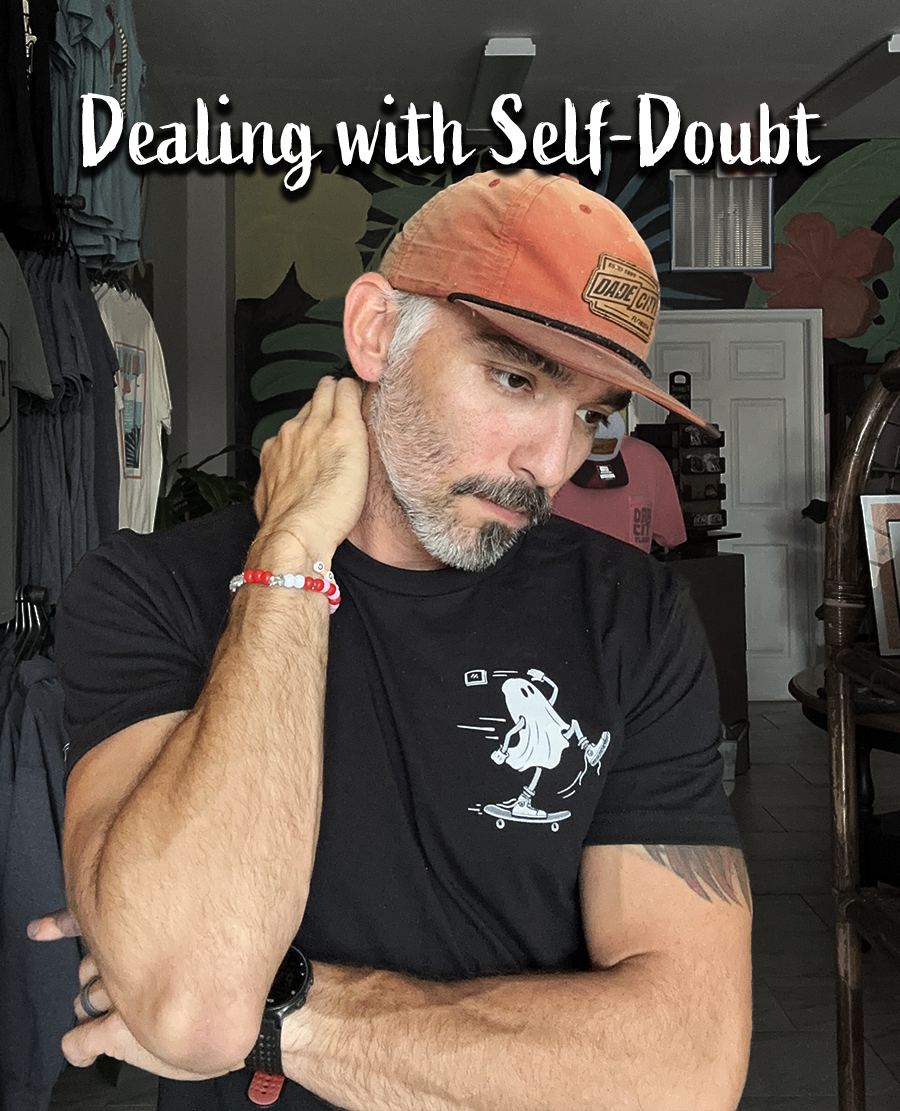You’re excited for a new adventure in your life, a big change in your lifestyle or career and you can’t wait to get started… then the self-doubt creeps in.
You start to question if you have the capacity for the challenge, being overly critical of yourself or feeling like a fraud. This begins to spiral…
What if I fail? What if I look foolish or incompetent. What will everyone think? Can I really do this? Am I wasting my time? I could never be good enough…
All of these thoughts and stories start to form in your mind. We lose faith in ourselves and our abilities. Self-doubt is something I think we’ve all experienced. Those all too familiar thoughts and feelings of uncertainty about ourselves, our potential or what we’re capable of.
I’d like to note that experiencing some self-doubt or uncertainty about your abilities is totally normal, especially when you’re attempting something that’s out of your comfort zone. This uncomfortable feeling is how we continue to grow and make progress. It’s when it starts to get out of control and impedes your progress that it becomes a concern. This usually leads to avoidance and procrastination, which can ultimately result in giving up and never really getting started.
Causes of Self-Doubt
Deep down at the core of self-doubt is fear. It’s a defense mechanism. Our brains are trying to protect us from failure, humiliation and emotional turmoil. It’s not comfortable with uncertainty. Our mind wants to keep us “safe" by staying in a familiar place. It does this through fear. We start thinking about all the things that could go wrong and start to create negative stories in our heads. We begin to doubt everything and ultimately this leads to self-sabotage. Talking yourself out of it.
For many of us self-doubt is deep seeded in our childhood, usually from parents, teachers, coaches, mentors or friends. This can happen if our parents are overly critical, disapproving or distant. It could even result from parents who were over protective, which has left you feeling like you’re incapable of doing anything on your own.
Sometimes it seems to come on out of no where, or from a specific experience. Events like getting passed over for a promotion, losing a sale, or making any kind of mistake may leave you feeling less than confident. Not only in the workplace but in other areas of your life as well. Whatever happened, it’s important to recognize and recall the specific event as the cause so we can work to move past it.
Cost of Self-Doubt
When self-doubt has taken hold, it can have a serious impact on our lives. We don’t speak up on our behalf, we hesitate to ask for what we want. Whether that be a pay raise, negotiating a sale or having a tough conversation with our spouse. We hold ourselves back and sorta lose our will to fight, we’re not confident enough to set firm boundaries.
This can affect our relationships, work life, leisure time and overall happiness. Here are some common effects of self-doubt in our lives:
- Lack of motivation
- Stress & Anxiety
- Feeling overwhelmed
- Procrastination
- Indecision
- Risk aversion
- Obstructed creativity
- Lost or passed up opportunities
Self-doubt can really diminish our confidence and resilience, which makes it very difficult for us to effectively serve others, lowers our growth potential and leads to an overall sense of unhappiness and regret.
How to Break Through
As far as moving past this, the most effective way is to start taking action. The only way out is to face it head-on and push through. Positive action leads to an increase in self-efficacy. Your confidence begins to snowball and you gain momentum to keep moving through it. Sit down and think about ways you can push your vision forward. Start small, make a plan and start executing on it. As you stack the wins you’ll begin to realize you really can do it. You start to believe you’re capable, or at least that it’s possible. Rest assured that you will figure it out as you go. You’ll gain the knowledge and skills you need to solve any problems that arise.
Watch How You Speak to Yourself
During this time it’s important to start standing up for yourself, against yourself. Pay attention to the thoughts you have and the things you say to yourself. You may be surprised at how often you speak negatively to and about yourself. Try to notice it in the moment and reverse it. Disagree and argue with it if it’s negative. If you catch yourself thinking thoughts like “You’re gonna fail, you always fail. Everyone was right. I don’t know whats wrong with me.” Realize it for what it is, they’re just made up stories and passing thoughts. Some of them may even be out of habit. Immediately stop it and correct yourself. “You’re gonna do it. You always find a way. You are more than capable.” Aim to make a habit out of this and soon you will notice that you start to have more positive thoughts and less negative ones. If you don’t start to correct it now, negative self talk will continue to worsen over time and the more deeply you’ll begin to believe it.
“Even If” Mindset
One thing that has helped me tremendously in moving past self-doubt is adopting an “even if” mindset. When I’ve set out to work on a project and those negative thoughts start to creep in, I use “even if” phrases. “Even if I fail miserably at this, worst case is I lose one client. One I don’t even have right now anyway.” Now of course, keeping that client is really important to us, but if the worst outcome is that they don’t want to work with us anymore, isn’t that something we can live with? It helps you realize that the vast majority of the negative events that could happen really aren’t such a huge deal. Not even close to the monumental catastrophes that your mind has made them out to be.
Self-Doubt as a Motivator
When I feel self-doubt starting to creep in I’ve learned to start paying attention. That it’s probably something I should explore more. That feeling of not being sure if I’m able to do it or not peaks my curiosity and competitive nature. We’re naturally driven to keep growing and expanding. The feeling of uncertainty identifies a gap between what you’re striving for and your current skill or knowledge level. This motivates me to want to fill that gap with the missing pieces in order to complete that task. Almost always the gap closes rather quickly and I accomplish the project that I was so unsure I could complete. This is extremely fulfilling and rewarding. It adds more confidence with each successful step and another tool for the tool box. If I don’t continually try things that make me feel uncertain or doubt if I can do it, I know I’m not reaching high enough or pushing myself enough. It takes a delicate balance of self-doubt and self-efficacy.
Benefits of Confronting Self-Doubt
When you decide to deal with and overcome self-doubt the benefits can be astonishing. As we build our confidence, we begin to act differently and those new actions lead to drastically different outcomes. Everything seems to come easier, we’re decisive, full of joy, less stressed and more “go with the flow”. Little by little the self-doubt and self-sabotage starts to dissipate.
It’s an amazing journey and feels incredible to make progress, but be weary of slipping back into those old familiar patterns. It takes constant focus and diligence to ensure that we maintain these new levels of self-efficacy and confidence. It’s important to learn that making mistakes and having set backs are all part of the process of growth. To not let them be a direct reflection of our perceived capabilities and self-worth.
Our best weapons in our battle against self-doubt are self-efficacy and confidence. The surest and fastest way to achieve higher levels of both is through action. Facing our fears and pushing through self-doubt to “do it anyway”. We have to continue to prove to ourselves that we really are capable. With each progressive step we start to believe we can do more and more. We start to reach higher, step out of our comfort zones a little further and achieve things that we once thought were out of the realm of possibility.
You already have what it takes, sometimes you just have to prove it to yourself…
Bonus Tips
- Remember that you’re your own worst critic
- Trace back and identify the source of our doubts (negative comments or experiences)
- Focus on your positive qualities and accomplishments
- Know your strengths and build on them
- Practice forgiving yourself
- Envision success and take action
- Focus less on doubts and more on the vision
- Avoid comparison with others
- Change how you speak to yourself (speak more positively)
- Keep learning and developing
- Focus on the vision instead of doubts
- Avoid negative or overly critical people
- Care for yourself consistently, exercise
- Keep a journal, write down not only doubts but also wins

